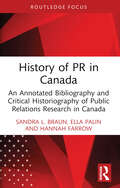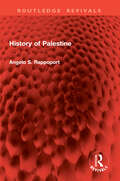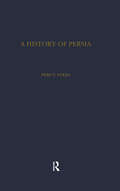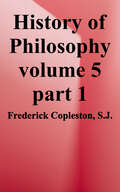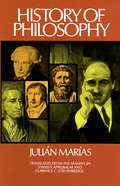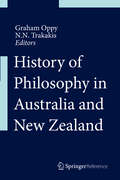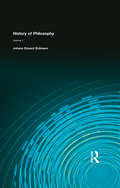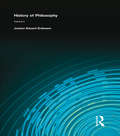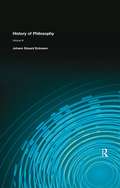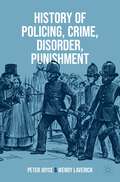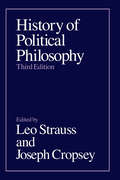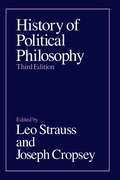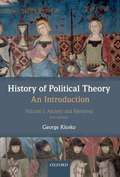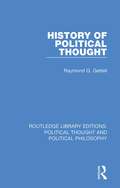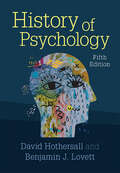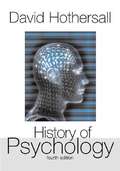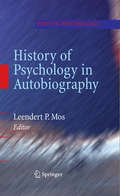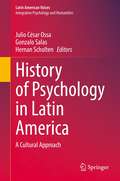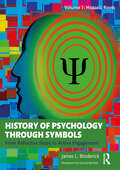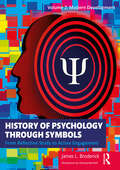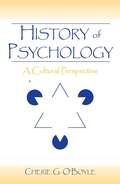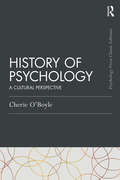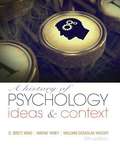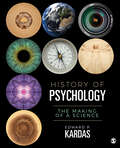- Table View
- List View
History of PR in Canada: An Annotated Bibliography and Critical Historiography of Public Relations Research in Canada (The History of Public Relations)
by Sandra L. Braun Ella Palin Hannah FarrowA first of its kind, this annotated bibliography provides an overview of the development of public relations research in the Canadian context. A valuable resource for researchers, students or practitioners, this bibliography surveys the landscape of public relations research in Canada. It orientates readers to this unique history, identifies gaps in research, suggests topics of future research, and offers critical historiography.This reference work will be of interest to scholars, students and practitioners in the fields of strategic communications, marketing or communications, providing a greater understanding of communications research in various Canadian contexts such as government, industry, corporate and nonprofit.
History of Palestine (Routledge Revivals)
by Angelo S. RappoportFirst published in 1931, History of Palestine is the dramatic picture of the Holy Land to which Jews returned after many centuries. The author has written the history of Palestine of 4000 years with the mind of the scholar and the heart of the religious mystic. Divided into three parts—pre-Israelite Palestine; Palestine, the promised land of the Hebrews; and Palestine, the holy land of Christendom, this book will appeal to students and researchers of history and general readers interested in the topic.
History of Persia (Routledge Library Editions)
by Sir Percy SykesThis is a facsimile of a classic history first published by Macmillan in 1915 and issued in two further editions by Routledge and Kegan Paul. Sir Percy Sykes was an explorer, consul, soldier and a spy who lived and travelled in Persia over a period of twenty-five years. This two-volume collection provides a comprehensive history of Persia from Alexander the Great, through British, French and Russian colonialism, to the early twentieth century oil industry.With a new introduction by Sykes' biographer, Antony Wynn, this comprehensive history provides essential background reading to students and academics of Persia.
History of Philosophy
by S. J. Frederick CoplestonConceived originally as a serious presentation of the development of philosophy for Catholic seminary students, Frederick Copleston's nine-volume A History Of Philosophy has journeyed far beyond the modest purpose of its author to universal acclaim as the best history of philosophy in English. <p><p>Copleston, an Oxford Jesuit of immense erudition who once tangled with A.J. Ayer in a fabled debate about the existence of God and the possibility of metaphysics, knew that seminary students were fed a woefully inadequate diet of theses and proofs, and that their familiarity with most of history's great thinkers was reduced to simplistic caricatures. Copleston set out to redress the wrong by writing a complete history of Western Philosophy, one crackling with incident an intellectual excitement - and one that gives full place to each thinker, presenting his thought in a beautifully rounded manner and showing his links to those who went before and to those who came after him.
History of Philosophy
by Julian MariasThorough and lucid survey of Western philosophy from pre-Socratics to mid 20th century: major figures, currents, trends, literature, significance, and more. Valuable section on contemporary philosophy -- Brentano, Ortega, Heidegger, others. One of the best elementary history of philosophy available. "Brevity and clarity of exposition..." -- Ethics.
History of Philosophy in Australia and New Zealand
by Graham Oppy N. N. TrakakisThe History of Philosophy in Australia and New Zealand is a comprehensive account of the historical development of philosophy in Australia and New Zealand, from the establishment of the first Philosophy Chair in Australasia in 1886 at the University of Melbourne to the current burgeoning of Australasian philosophy. The work is divided into two broad sections, the first providing an account of significant developments and events during various periods in the history of Australasian philosophy, and the second focusing on ideas and theories that have been influential in various disciplines within Australasian philosophy. The work consists of chapters contributed by various philosophers, on specific fields of inquiry or historical periods within Australasian philosophy.
History of Philosophy: Volume I
by Erdmann, Johann EduardFirst published in 2002. Routledge is an imprint of Taylor & Francis, an informa company.
History of Philosophy: Volume II
by Erdmann, Johann EduardFirst published in 2002. Routledge is an imprint of Taylor & Francis, an informa company.
History of Philosophy: Volume III
by Erdmann, Johann EduardFirst published in 1964 and reprinted in 2013. This is a text is a history of Philosophy as compiled by Johann Eduard Erdmann, professor of Philosophy in the University of Halle and translated into English by Williston S. Hough. This is Volume III of three and covers German Philosophy since Hegel
History of Policing, Crime, Disorder, Punishment
by Peter Joyce Wendy LaverickThis engaging textbook provides a broad and unique coverage of the key historical events that shaped ideas in criminology, criminal justice and policing from the late seventeenth century to the early twenty-first century in England and Wales. It vividly illustrates the multi-disciplinary nature of criminology and penology by providing important insights into the social and political issues that shaped the development and operations of the criminal justice system and its responses to both crime and disorder. Using key text boxes, this book highlights key people, theorists, foundational principles and events throughout. Part One discusses the nature of crime and forms of punishment between 1689 and 1750 and the penological concerns regarding the aims of punishment. Part Two focuses on crime and disorder between 1750 and 1850, examining the impact of urbanization on criminal activity and it considers the background and state responses to key episodes of public disorder. Part Three covers the development of policing 1689-1856 and the contribution to policing made by reformers and the implementation of police reform. Part Four deals with a number of issues affecting crime and punishment between 1850 and 1920 including episodes such as Irish Home Rule within the context of ‘high policing’. It evaluates changes to the nature and role of prisons that occurred in this period. This student-friendly book contains end of chapter questions which summarise and enable further discussion.
History of Political Philosophy
by Leo Strauss and Joseph CropseyThis volume provides an unequaled introduction to the thought of chief contributors to the Western tradition of political philosophy from classical Greek antiquity to the twentieth century. Written by specialists on the various philosophers, this third edition has been expanded significantly to include both new and revised essays.
History of Political Philosophy (Third Edition)
by Leo Strauss Joseph CropseyWritten by specialists on the various philosophers, this third edition has been expanded significantly to include both new and revised essays.
History of Political Theory: Volume I: Ancient And Medieval
by George KloskoHistory of Political Theory: An Introduction is an engaging introduction to the main figures in the history of Western Political Theory and their most important works. Volume I traces the development of political theory "from the beginning" in ancient Greece through the Reformation. Main subjects examined include the Classical political theory of the Greek polis, the Hellenistic period, the rise of Christian political theory, political theory of the middle ages, and the Reformation. Major figures examined include Socrates, Plato, Aristotle, St. Augustine, St. Thomas, Marsilius of Padua, and Martin Luther. Throughout, the great theorists are closely examined in their historical contexts, with extensive quotations allowing them to speak for themselves.
History of Political Thought (Routledge Library Editions: Political Thought and Political Philosophy #25)
by Raymond G. GettellFirst published in 1924. This extensive volume explores the history of political theory from Ancient Greece up until proletarian thought in the early twentieth century. The author pays particular attention to the connection between economic and political theory during the eighteenth and nineteenth centuries. History of Political Thought will be of great interest to students of history, politics, and philosophy.
History of Psychology
by David Hothersall Benjamin J. LovettHothersall and Lovett's History of Psychology is a lively survey of the evolution of the field from 1850 to the present. Built around the lives of fascinating thinkers who proposed bold new ways of studying human behavior and mental processes, and telling the true stories behind their famous experiments, this textbook provides students with an intimate understanding of how psychology came to be what it is today. Thoroughly updated with the latest historical scholarship, the fifth edition includes greater focus on the contributions of women and people of color, and a new chapter on the late twentieth century and the cognitive revolution. It also features updated pedagogy such as chapter discussion questions and unique archival photographs, while instructor resources include a test bank, lecture slides, and an instructor manual.
History of Psychology (Fourth Edition)
by David HothersallEmploying a biographical approach, this text details the important scientific accomplishments of psychology through the lives of the men and women who pioneered the seminal theories driving the discipline. The successes and failures of these distinguished psychologists provide a thorough and complete history of the field and show students its relevance to contemporary psychology.
History of Psychology in Autobiography
by Leendert P. MosSince the 17th century, autobiography has an honorable place in the study of history. In 1930, the preeminent historian of psychology, Edwin Boring, writes that a science separated from its history lacks direction and promises a future of uncertain importance. To understand what psychology is and what it is becoming, the autobiographies of famous psychologists is history at it best. Here we find model inquirers of the science who offer a personalized account of themselves and their vocation in the context of the history of the science. What is characteristic of many of those who have contributed to an alternate vision of psychological science is that they never considered themselves, or were considered by others, as belonging to the mainstream of the discipline. In considering an alternative history of psychology in autobiography, the editor invited contributors whose research and writings have pushed the discipline in other directions, pushed its limits, and whose scholarship finds its philosophical framework outside the discipline altogether. If these contributors may not be model inquirers, their scholarship is very much a matter of consequence for those who wish to understand psychology. Among the outliers included here are those who devoted themselves to the writing of psychology, examining its history, theories, research and professional practices, and who enthusiastically embraced, over the course of their lives, the discipline as a human science. Their influence has been subtle as has been their appeal to many students who affection for the discipline finds its promise in a discerning self-awareness and a critical understanding of others and their worlds. This volume is not simply a collection of personal chronologies which might inspire or lend appreciation to a younger generation. Our contributors write from their personal and professional experience, of course, but they write of their thinking and understanding of the psyche as an aspect of human life, of psychology as an academic form of human sciences' inquiry, and so bring to bear their scientific and philosophical imagination to their personal challenges in their chosen vocation as psychologists. Our contributors cover a broad swath of the second half of the 20th century, the century of psychology. Nurturing the discipline from within various philosophical, social-political, and cultural roots, their autobiographies exemplify marginality, if not alienation, from the mainstream, even as their professional and personal lives give expression to engaged scholarship, commitment to vocation and, straightforwardly and reflectively, a love of the heart. From Germany, Carl Graumann, from France, Erika Apfelbaum, from Canada, David Bakan and Kurt Danziger, and from the United States, Amedeo Giorgi, Robert Rieber, and Joseph Rychlak, relate their lives to the larger contexts of our times. Their personal stories are an integral part of the historiography of our discipline. Indeed, a contribution to historiography of our discipline is constituted in their autobiographical self-presentations, for their writings attest as much to their lives as model inquirers as they do to the possibility of psychology as a human science.
History of Psychology in Latin America: A Cultural Approach (Latin American Voices)
by Julio César Ossa Gonzalo Salas Hernan ScholtenThis book presents a cultural history of psychology that analyzes the diverse contexts in which psychological knowledge and practices have developed in Latin America. The book aims to contribute to the growing effort to develop a theoretical knowledge that complements the biographical perspective centered on the great figures, with a polycentric history that emphasizes the different cultural, social, economic and political phenomena that accompanied the emergence of psychology. The different chapters of this volume show the production of historians of psychology in Latin America who are part of the Ibero-American Network of Researchers in History of Psychology (RIPeHP, in the Portuguese acronym for "Rede Iberoamericana de Pesquisadores em História da Psicologia"). They present a significant sample of the research carried out in a field that has experienced a strong development in the region in the last decades. The volume is divided into two parts. The first presents comparative chapters that address cross-cutting issues in the different countries of the region. The second part analyzes particular aspects of the development of psychology in seven countries: Argentina, Brazil, Chile, Colombia, Mexico, Paraguay and Peru. Throughout these chapters the reader will find how psychology made its way through dictatorial governments, phenomena of violence and internal armed conflict, among others. Dimensions that include rigorous analysis ranging from ancestral practices to current geopolitical knowledge of the Latin American region. History of Psychology in Latin America - A Cultural Approach is an invaluable resource for historians of psychology, anywhere in the world, interested in a polycentric and critical approach. Since its content is part of the "cultural turn in psychology" it is also of interest to readers interested in the social and human sciences in general. Finally, the thoroughly international perspective provided through its chapters make the book a key resource for both undergraduate and graduate teaching and education on the past and current state of psychology.
History of Psychology through Symbols: From Reflective Study to Active Engagement. Volume 1: Historic Roots
by James BroderickVolume One of The History of Psychology through Symbols provides a groundbreaking approach by expanding the roots of psychology beyond the Greeks to concurrent events during the same period (800 BCE–200 BCE), defined as the Axial Age by German-Swiss psychiatrist Karl Jaspers. The Axial Age emphasized seeking the universal connection that unites all humanity, a focus not on what one believed, but how one lived. This includes the human desire to connect to something greater, the totality of being human, explained by using symbols, the universal language. This volume describes the psychological implications of the Axial Age through the developments of Buddhism, Hinduism, Confucianism, Daoism, Judaism, and Zoroastrianism, as well as Greek thought. Rooted in the Axial Age, Volume One explores how the Christian and Islamic eras influenced psychology, which resulted in the Renaissance and the Scientific Revolution, which provided the historic roots of modern psychology. Rejecting the idea that science transcends historical events, this volume provides a political, socioeconomic, and cultural context for all the historic developments. The chapter on the history of mental illness provides inspiration for a new mental health system with specific recommendations for radical system reform. In the spirit of the Axial Age on the importance of how one lives, there is an emphasis on engagement with symbols and with specific exercises, called emancipatory opportunities, to apply the lessons of psychological history to daily life. This book is ideal for those seeking a dynamic and engaging way of learning about or teaching the history of psychology and would also be of interest to students, practitioners, and scholars of science, philosophy, history and systems, religious studies, art, and mental health and drug and alcohol treatment, as well as those interested in applying the lessons of history to daily life.
History of Psychology through Symbols: From Reflective Study to Active Engagement. Volume 2: Modern Development
by James BroderickVolume Two of The History of Psychology through Symbols continues a groundbreaking approach of using symbols to deepen the understanding of psychological history as well as the importance of how one lives, an emphasis on engagement with symbols and with specific exercises, called emancipatory opportunities, to apply the lessons of psychological history to daily life. From the birth of modern psychology in the laboratory of Wilhelm Wundt, Volume Two discusses how the early theories of voluntarism, structuralism, evolution, and pragmatism influenced the modern development of psychology. The importance of making unconscious shadow forces in science conscious is explored through the impact of the eugenic movement, the controversies surrounding the development of psychological testing, and current research biases in psychology. Volume Two describes how clinical psychology emerged as a powerful profession in mental health care. The Four Forces of Psychology are explored through their natural and hermeneutic science influences. Psychoanalytic and Jungian analytical psychology comprise the first force, behaviorism the second force, humanistic-existential the third force, and transpersonal psychology the fourth force that includes a groundbreaking discussion of psychedelic history and research that could revolutionize mental health and drug and alcohol treatment. Rejecting that science transcends historical events, this volume provides a political, socioeconomic, and cultural context for modern psychology and all Four Forces of Psychology. This book is ideal for those seeking a dynamic and engaging way of learning about or teaching the history of psychology and would also be of interest to students, practitioners, and scholars of science, philosophy, history and systems, religious studies, art, and mental health and drug and alcohol treatment, as well as those interested in applying the lessons of history to daily life.
History of Psychology: A Cultural Perspective
by Cherie G. O'BoyleHistory of Psychology: A Cultural Perspective easily distinguishes itself from other texts in a number of ways. First, it examines the field within the rich intellectual and cultural context of everyday life, cross-cultural influences, and contributions from literature, art, and other disciplines. Second, it is a history of ideas, concepts, and questions, instead of dates, events, or great minds. Third, the book explores the history of applied, developmental, clinical, and cognitive psychology as well as experimental psychology. Conveyed in a lively writing style, this text tells a gripping story that continues to the present day. Its current perspective allows students to connect the history of the field to the work being published in current journals. O’Boyle writes in the “historical present”, giving readers a sense of immediacy and aliveness as they journey through history. Her account uses imaginative new features, including “The Times”, which gives readers a feel for what everyday life was like during the age discussed in the chapter. Descriptions of ordinary life, as well as information about important issues influencing their lives such as wars, social movements, famines, and plagues, pique students' interest. "Stop and Think" questions, scattered throughout, enhance retention and encourage critical thinking. An ideal text for a history of psychology or history and systems of psychology course, this creative new book will also appeal to those with a general interest in the field.The Instructor’s Resource CD, written by the text author, includes class activities and demonstrations, suggestions for small group and class discussions, a list of films and videos related to the material in each chapter, and a test bank with objective and essay questions.
History of Psychology: A Cultural Perspective (Psychology Press & Routledge Classic Editions)
by Cherie O'BoyleThis classic edition includes a new foreword by former APA President Antonio E. Puente which primes the reader for a unique, bold and lively account of the history of psychology that remains relevant and useful to this day. This text surveys core areas in the history of psychology, covering the history of applied, developmental, clinical, cognitive and experimental psychology. O’Boyle writes in the "historical present," which gives readers a sense of immediacy and aliveness as they journey through history. Her account uses imaginative new features, including "The Times," which gives readers a feel for what everyday life was like during the age discussed in the chapter. Descriptions of ordinary life, as well as information about important issues influencing people’s lives such as wars, social movements, famines, and plagues will pique student interest. "Stop and Think" questions, scattered throughout, enhance retention and encourage critical thinking. This book continues to provide a creative, distinct, and valuable contribution to the field, and is an essential read for undergraduate students undertaking courses in the history of psychology and history of science, history and systems of psychology, and introductory psychology.
History of Psychology: Ideas and Context
by Wayne Viney D. Brett King William Douglas WoodyA History of Psychology: Ideas & Context, 5/e, traces psychological thought from antiquity through early 21st century advances, giving students a thorough look into psychology's origins and development. This title provides in-depth coverage of intellectual trends, major systems of thought, and key developments in basic and applied psychology.
History of Psychology: The Making of a Science
by Edward P. KardasHistory of Psychology: The Making of a Science provides students with a comprehensive overview of the formulation of the field of psychological science. Starting with a chapter on 21st Century Psychology and then jumping to the dawn of civilization, author Edward P. Kardas is able to make connections between early understandings of human behavior with our current understandings and interpretations of psychological research. Through highlighting the zeitgeist of the era and making connections to the related fields of philosophy, computational science, biology, and social science, students will have a deeper understanding of how and why the field has formed in its current landscape and a sense for where it’s headed next.
